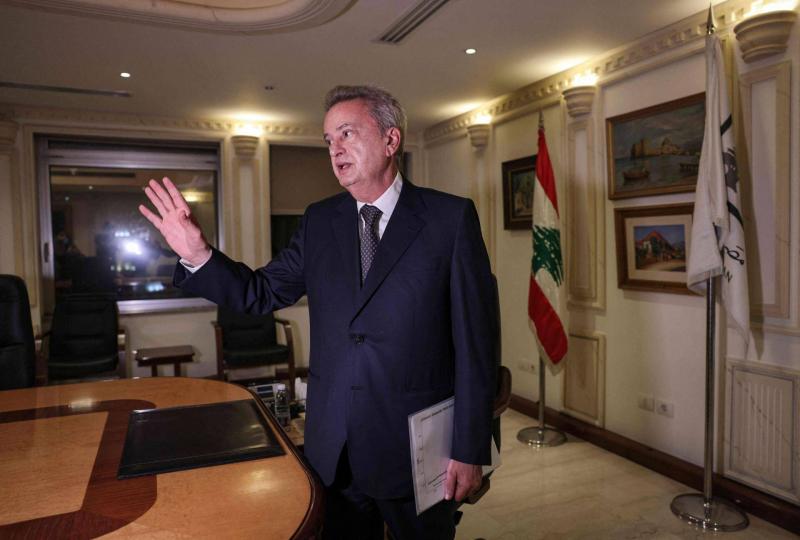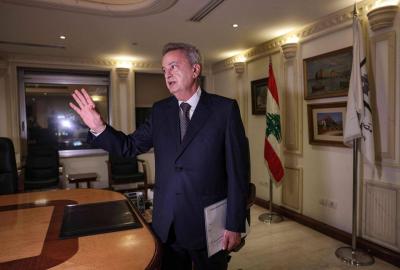Lebanon's central bank governor, Riad Salameh, is no longer hesitant (at least theoretically) about granting new banking licenses. He is aware that the existing banking sector, described by International Monetary Fund experts as "insolvent" and "zombie," no longer meets basic banking needs such as safely receiving deposits and prudently extending loans. This situation will likely persist for a relatively long period alongside the procrastination in implementing the IMF conditions.
Preliminary information indicates that Salameh has acknowledged the principle of granting three new licenses but is taking his time in making a final decision for various reasons. These reasons primarily relate to the duration of his term as governor and his views on which parties should meet the licensing requirements, as well as how the public will receive this very positive news for some and very negative for others.
### The Banks Will Fight Back
It is no secret that the Association of Banks is not easily accepting the entry of new players at this time. They prefer to postpone this step until after an agreement on a banking restructuring plan, capital control measures, and a financial regularization project that distributes losses and/or repays deposits is reached! All of this is naturally subject to the Association of Banks’ conditions, given the current balance of power. Otherwise, the fierce war continues, characterized by strikes that disrupt people’s interests, threats of disasters, and "arrangements" with influential figures to obstruct lawsuits filed by depositors and those harmed by banks.
### The Guardian of the Structure
A close observer of the events and someone somewhat familiar with the underlying obstacles will discover that Salameh's announcement of the intention to grant new licenses is not sufficient to absolve him of his responsibilities in this complex and controversial issue. The Bank Governor is taking the utmost care in changing the banking landscape that he has crafted for thirty years. How could he not, while clinging to the theory of never allowing any bank to fail even at the expense of public funds and depositors? He is the primary implementer of a shadow plan based on "liquidating" dollar deposits to extinguish bank losses cheaply while maintaining most of the existing banks by granting them relatively long deadlines to improve their conditions, regardless of the impact on the depositors.
In this context, he issued a circular allowing gradual capital increases using various tools and strange facilitation measures, such as re-evaluating real estate assets, all while waiting for the approval of the banking restructuring law currently before Parliament. The mentioned project includes the possibility of recapitalization within three years from the date the law is approved, though it might actually take three to five years, at a minimum, for a project of this magnitude.
### A Distorted Framework
In related discussions with Salameh, international parties insist that new licenses must be issued soon for several reasons, primarily that merely announcing the granting of licenses will compel many banks to expedite their restructuring and capital increases to stay in the market and not lose their share to new entrants. However, this logic is not entirely valid when considering the question of whether changing a series of laws that have been subject to interpretations, which are among the causes of the crisis, such as the Currency and Credit Law, will actually expedite the situation. Will the mandatory foreign currency reserves continue to be enforced? What about separating the Banking Supervision Committee from the "authority" of the Bank Governor, and the necessity of transforming the committee into an independent authority? Additionally, there’s a critical need to separate the governor from positions like the presidency of the Capital Markets Authority, the Special Investigation Commission, and the Higher Banking Authority. This dubious monopolization of positions has led to the financial "tyranny" of a non-innocuous ruler!
### On the Other Side
The step of granting new licenses may succeed if issued to foreign banks, but limiting them to local capital owners could reopen the door to bankers who have previously exited through the backdoor. They are part of those responsible for the crisis and have fled with their funds, only to return on white horses to seize licenses under new names as if nothing had happened.
### Necessity...
If additional reasons are needed to emphasize the necessity of opening the licensing door, it can be noted that after a final agreement with the IMF and the imminent injection of financing installments (three billion dollars) alongside other billions from international lenders and donors, these financing entities prefer to engage with trustworthy, clean banks rather than dealing with existing ones that have not yet cleaned up their balance sheets or recapitalized.
### Politicians on Watch
However, there are questions about whether Salameh will issue the licenses before leaving the governorship or whether they will remain shelved for his successor. This question is not trivial, given the substantial interests involved. Individuals linked to political entities, such as the "Shia duo," specifically Speaker of the Parliament Nabih Berri, the Free Patriotic Movement, particularly its leader MP Gibran Bassil, and others, may be aspiring to obtain such licenses. Another question is whether such individuals will receive licenses despite the conditions that will be "written" under the scrutiny of international bodies like the IMF. Or will they pass cleanly in form but be politically manipulated in content, similar to most interest distributions on the historical map of Lebanese politicking, which has not changed one iota despite the earthquake of the crisis?
It should finally be noted that there will surely be those linking the granting of licenses to ensuring Salameh’s safe exit from the governorship. However, the matter is not that simple following European investigations into Salameh and his brother, along with others, over serious accusations—unless local prosecution prevents European investigations from reaching their conclusions. Here lies another precarious issue!




